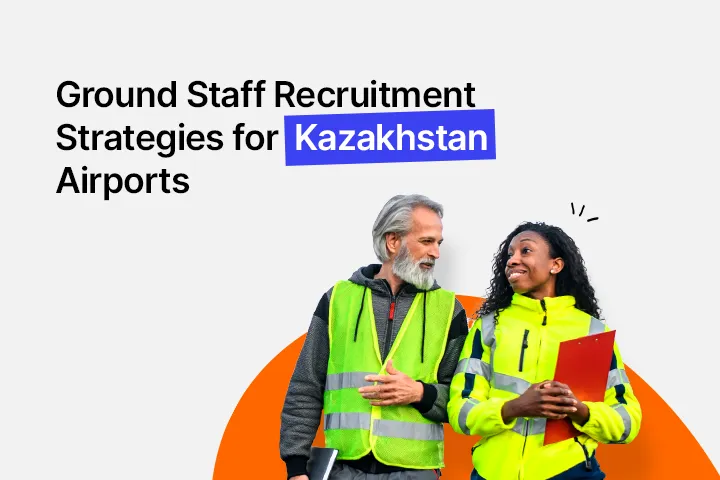The Growing Demand for Logistics Professionals in Oman (2026)
Oman’s logistics sector is undergoing rapid transformation, driven by the government’s Vision 2040 and investments in infrastructure, digitalization, and e-commerce. As the country accelerates its efforts to become a regional logistics hub, the demand for skilled professionals in this sector has skyrocketed. From warehouse managers to supply chain analysts, the right talent is crucial for maintaining competitive advantage in 2026.
In a market where customer expectations for fast and efficient deliveries are rising and digital transformation reshapes logistics processes, hiring the right professionals is not just a need but a strategic necessity for employers in Oman.
Suggested: Top Recruitment Platforms in Oman
Key Trends Shaping Logistics Hiring in Oman
- E-commerce Growth:
Oman’s e-commerce sector is one of the fastest-growing in the region, driving demand for roles such as last-mile delivery specialists and inventory analysts.
- Digital Transformation:
Technology, including ERP systems and AI-driven logistics, is changing how supply chains operate. This requires hiring professionals who can manage digital systems and automate processes.
- Vision 2040:
With Oman’s Vision 2040 focusing on logistics as a key pillar of its economic growth, investment in ports and free zones (Duqm, Sohar) continues to create new opportunities.
In 2026, hiring the right logistics talent is essential to remain competitive in this fast-evolving sector.
1. Overview of Logistics Hiring in Oman
The Demand for Logistics Professionals in Oman
The logistics sector in Oman is expected to grow by approximately 7% annually through 2026, driven by:
- Port expansions and logistics hubs
- Increased cross-border e-commerce and global trade
- Rapid growth in digital supply chain solutions
This growth is also supported by government investments in logistics infrastructure. As businesses strive to meet high service standards, the demand for professionals who can manage complex logistics systems, from cold chain logistics for pharmaceuticals to automated supply chains, is on the rise.
Suggested: Top Hiring Trends in Oman
Key Roles in Demand
Oman’s logistics transformation has led to an increase in the need for:
- Logistics Managers & Coordinators:
Responsible for efficient goods movement, route optimization, and supplier collaboration.
- Warehouse Supervisors & Supply Chain Managers:
Critical for maintaining smooth operations from entry to delivery.
- Specialized Roles:
Roles like IT-enabled supply chain professionals and cold chain managers are becoming harder to fill, particularly for those with advanced digital skills in ERP systems or data analytics.
In-demand skills include:
- Proficiency with ERP systems (SAP, Oracle)
- Supply chain analytics
- Bilingual capabilities (Arabic and English)
2. Qualifications and Skills Needed for Logistics Professionals in Oman
Required Education & Certifications
For logistics roles in Oman, employers typically require:
- A Bachelor’s degree in logistics, supply chain management, or business administration.
- Certifications:
- APICS CSCP (Certified Supply Chain Professional)
- Six Sigma (Green Belt or Black Belt)
- PMP (Project Management Professional)
- SAP/Oracle certifications for tech-focused logistics roles
Fluency in Arabic and English is highly valued, particularly for multinational operations. Additionally, advanced certifications in digital logistics (e.g., SAP for warehouse management) are becoming essential.
Knowledge of Omanization policies is also crucial, as local talent is prioritized within recruitment frameworks.
Suggested: Guide on How to Hire Employees in Oman
Essential Skills for 2026
Logistics professionals in 2026 need both technical expertise and strong soft skills:
- Technical Skills:
- Proficiency in warehouse management systems (WMS)
- ERP tools like SAP
- Supply chain analytics for optimizing processes
- Soft Skills:
- Problem-solving and decision-making
- Cross-functional team management
- Effective communication across departments
As digital transformation and automation increase, adaptability to new technologies is critical for success in logistics roles.
3. Recruitment Challenges in Oman
Key Recruitment Hurdles
Despite the growing demand for logistics talent, there are challenges:
- Skill Shortages:
Digital and global supply chain expertise is in high demand but short supply.
- Competition:
Both local businesses and international firms operating in Oman’s free zones are competing for the same skilled professionals.
- Retention:
Talented logistics professionals are often attracted by overseas opportunities or higher compensation packages from global companies.
To tackle these challenges, employers must offer attractive career development opportunities and competitive salaries.
Suggested: How Does Employee Onboarding Work in Oman
4. Effective Hiring Channels for Logistics Roles in Oman
Top Job Platforms for Logistics Professionals
To find qualified candidates, use a mix of:
- Global Platforms:
Qureos, LinkedIn, Bayt, Gulftalent
- Local Platforms:
These cater to Oman’s unique hiring needs and Omanization policies.
- Recruitment Agencies:
Agencies like those listed in Oman Recruitment Agencies have deep networks and pre-vetted candidates ready for logistics roles.
5. Legal Considerations for Hiring Logistics Professionals in Oman
Labor Laws Impacting Logistics Recruitment
Employers must adhere to Oman’s labor laws:
- Work hours:
Standard workweek capped at 45 hours.
- Employment contracts:
Formal contracts are required, outlining roles, compensation, and duration.
- Omanization:
Companies must comply with Omanization quotas, prioritizing local talent in recruitment.
Suggested: Tips for Onboarding New Logistics Professionals
Work Permits & Visas for Foreign Talent
Employers hiring expatriates must:
- Secure work permits from the Ministry of Manpower
- Ensure foreign hires meet medical and credential checks
- Stay compliant with Omanization policies and labor laws
7. Conclusion
Oman’s logistics sector is undergoing a major transformation, and hiring the right professionals is crucial to staying competitive. With a growing demand for skilled professionals, including those with expertise in digital supply chain management, e-commerce logistics, and cold chain solutions, employers must adapt to these changes.
By leveraging the right hiring channels, offering competitive compensation, and complying with local labor laws, businesses can secure the top logistics talent needed to thrive in 2026. Proactive recruitment strategies are essential for success in Oman’s rapidly evolving logistics landscape.
Suggested: Top Sourcing Tools For Recruiters
FAQs: Logistics Recruitment in Oman
What are the best recruitment platforms for logistics professionals in Oman?
Qureos, LinkedIn, Bayt, Gulftalent, and local recruitment agencies specializing in logistics.
How to hire logistics professionals in 2026?
Leverage job boards, recruitment agencies, and professional networks. Focus on candidates with relevant certifications and experience in ERP or WMS platforms.
Which skills are essential for logistics professionals in Oman?
Skills include expertise in WMS, ERP systems, supply chain analytics, and strong communication. Bilingual capabilities (Arabic/English) are highly valued.
What qualifications are required for logistics roles in Oman?
A bachelor’s degree in logistics, supply chain management, or business administration. Certifications like APICS CSCP and Six Sigma enhance job prospects.
How to retain top logistics talent in Oman?
Offer career progression, leadership training, competitive pay, performance bonuses, and professional development.
What are the salary expectations for logistics professionals in Oman?
Salaries range from OMR 600–900 for entry-level roles to OMR 2,500+ for senior logistics professionals.
What are the top challenges in logistics recruitment in Oman?
Skill shortages, competition for experienced professionals, and compliance with Omanization policies.
Which job platforms specialize in logistics recruitment?
In addition to LinkedIn and Bayt, platforms like Qureos, Naukrigulf and local recruitment agencies focusing on logistics are useful.
What benefits should logistics employers offer to attract talent in Oman?
Healthcare, annual leave, performance bonuses, professional development support, flexible work arrangements, and wellness programs.
What are the legal requirements for hiring foreign logistics professionals in Oman?
Employers must obtain work permits, comply with Omanization quotas, and provide formal contracts.
{{tool-oman="/sandbox/home-v3"}}




